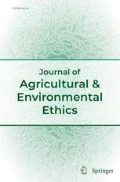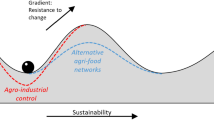Abstract
What kind of futures does agro-food imaginaries enable and who can get involved in the making of agro-food futures? In this respect, what can the increasingly influential idea of circular economy potentially offer in terms of enabling more sustainable agrofood futures? We approach this task by first outlining the interconnected challenges that the agro-food system is facing related to environmental degradation, economic crises and social problems. Then we consider the way these challenges are being addressed in agro-food studies. We argue that agro-food research in recent years has seen important contributions in relation to studies of alternative food networks and the “quality” turn. These research agendas have challenged the current logic of the food system in terms of offering alternative visions of future development. We highlight two examples from the literature—the eco-economy and the integrated territorial agri-food paradigm—that develop broader frameworks for rethinking the future of the agro-food system and which have distinguished themselves in contrast to the industrialized and globalized conventional food system. We find that with respect to reorienting and reconfiguring economic structures and relations all three approaches share a common goal, but circular economy stands out in relation to the actors that are included by, for example, emphasizing collaborations and partnerships with extant agro-food businesses. Also with regards to scalar politics, it would be prudent to consider the potentials offered by the increasingly influential ideas around circular economy.



Similar content being viewed by others
References
Alrøe, H. F., & Noe, E. (2014). Second-order science of interdisciplinary research: A polyocular framework for wicked problems. Constructivist Foundations, 10, 65–95.
Ambler-Edwards, S., Bailey, K., Kiff, A., Lang, T., Lee, R., Marsden, T., et al. (2009). Food futures: Rethinking UK strategy. Chatham House, London: Royal Institute of International Affairs.
BERAS. (2015). BERAS International Foundation. BERAS. http://beras.eu/about-us/foundation/. Accessed 16 Sept 2015.
Bilitewski, B. (2012). The circular economy and its risks. Waste Management, 32, 1–2.
Campbell, H., & Rosin, C. (2011). After the ‘organic industrial complex’: An ontological expedition through commercial organic agriculture in New Zealand. Journal of Rural Studies, 27, 350–361.
Carolan, M. S. (2013). The wild side of agro-food studies: On co-experimentation, politics, change, and hope. Sociologia Ruralis, 53, 413–431.
Crang, M., Hughes, A., Gregson, N., Norris, L., & Ahamed, F. (2013). Rethinking governance and value in commodity chains through global recycling networks. Transactions of the Institute of British Geographers, 38, 12–24.
Ellen MacArthur Foundation. (2012). Towards the circular economy: Economic and business rationale for an accelerated transition (Vol. 1). Cowes: Ellen MacArthur Foundation.
Ellen MacArthur Foundation. (2013). Towards the circular economy: Opportunities for the consumer goods sector. Cowes: Ellen MacArthur Foundation.
Ellen MacArthur Foundation. (2014). CE100 participants. Cowes: Ellen MacArthur Foundation.
Ellen MacArthur Foundation. (2015). Growth within: A circular economy vision for a competitive europe (p. 97). Cowes: Ellen MacArthur Foundation.
European Commission. (2011). Roadmap to a resource efficient Europe, COM(2011) 571 final. Brussels: European Commission.
European Commission. (2012). Manifesto for a resource-efficient Europe. In E. Commission (Ed.), European Commission, Brussels.
European Commission. (2013a). Action—for a resource efficient Europe. European resource efficiency platform (EREP). Brussels: European Commission.
European Commission. (2013b). Decision of the European Parliament and of The Council on a General Union Environment Action Programme to 2020 “Living well, within the limits of our planet”. In Council, T. (Ed.), 2012/0337 (COD). European Commission, Strasbourg.
European Commission. (2014). Towards a circular economy: A zero waste programme for Europe. In E. Commission (Ed.), European Commission, Brussels.
Flyvbjerg, B. (2001). Making social science matter: Why social inquiry fails and how it can succeed again. Cambrigde: Cambridge University Press.
Flyvbjerg, B. (2003). Rationality and power. In S. Cambell & S. S. Fainstein (Eds.), Readings in planning theory (2nd ed., pp. 318–329). Oxford: Blackwell.
Flyvbjerg, B. (2004). Phronetic planning research: Theoretical and methodological reflections. Planning Theory & Practice, 5, 283–306.
Flyvbjerg, B. (2006). Social science that matters. Foresight Europe, 2, 38–42.
Fooddrinkeurope. (2014). Europe’s food and drink industry committed to a European circular economy.
Foresight, (2011). The future of food and farming, final project report. Foresight, London: The Government Office for Science.
Gregson, N., Crang, M., Fuller, S., & Holmes, H. (2015). Interrogating the circular economy: The moral economy of resource recovery in the EU. Economy and Society, 44, 218–243.
Hinchliffe, S., Kearnes, M. B., Degen, M., & Whatmore, S. (2005). Urban wild things: A cosmopolitical experiment. Environment and Planning D: Society and Space, 23, 643–658.
Hobson, K. (2016). Closing the loop or squaring the circle? Locating generative spaces for the circular economy. Progress in Human Geography, 40, 88–104.
Horlings, I., Kitchen, L., Marsden, T., & Bristow, G. (2010). Exploring the potential contributions of the bio–and eco–economy to agri-food and rural regional development BRASS. Cardiff: The ESRS Centre for Business Relationships, Accountability, Sustainability and Society, Cardiff University.
Horlings, L. G., & Marsden, T. K. (2011). Towards the real green revolution? Exploring the conceptual dimensions of a new ecological modernisation of agriculture that could ‘feed the world’. Global Environmental Change, 21, 441–452.
Horlings, L. G., & Marsden, T. K. (2014). Exploring the ‘New Rural Paradigm’ in Europe: Eco-economic strategies as a counterforce to the global competitiveness agenda. European Urban and Regional Studies, 21(1), 4–20.
Kitchen, L., & Marsden, T. (2009). Creating sustainable rural development through stimulating the eco-economy: Beyond the eco-economic Paradox? Sociol Ruralis, 49, 273–294.
Kristensen, D. K., & Kjeldsen, C. (2016). Imagining and doing agro-food futures otherwise: Exploring the Pig City experiment in the foodscape of Denmark. Journal of Rural Studies, 43, 40–48.
Lamine, C., Renting, H., Rossi, A., Wiskerke, H., & Brunori, G. (2012). Agri-food systems and territorial development: Innovations, new dynamics and changing governance mechanisms. In I. Darnhofer, D. Gibbon & B. Dedieu (Eds.), Farming systems research into the twenty-first century: The new dynamic (pp. 229–256). New York: Springer.
Lang, T. I. M. (2010). Crisis? What crisis? The normality of the current food crisis. Journal of Agrarian Change, 10, 87–97.
Lee, B., Preston, F., Kooroshy, J., Bailey, R., & Lahn, G. (2012). Resources futures. London: Chatham House.
Lepawsky, J., & Mather, C. (2011). From beginnings and endings to boundaries and edges: Rethinking circulation and exchange through electronic waste. Area, 43, 242–249.
Lowe, P. (2010). Enacting rural sociology: Or what are the creativity claims of the engaged sciences? Sociol Ruralis, 50, 311–330.
MacKinnon, D. (2011). Reconstructing scale: Towards a new scalar politics. Progress in Human Geography, 35, 21–36.
Marsden, T. (2004). The quest for ecological modernisation: Re-spacing rural development and agri-food studies. Sociologia Ruralis, 44, 129–146.
Marsden, T. (2013). Sustainable place-making for sustainability science: The contested case of agri-food and urban-rural relations. Sustainability Science, 8, 213–226.
Marsden, T., & Farioli, F. (2015). Natural powers: From the bio-economy to the eco-economy and sustainable place-making. Sustainability Science, 10, 331–344.
Marsden, T., & Morley, A. (2014). Sustainable food systems: Building a new paradigm, earthscan food and agriculture (p. 230). New York: Routledge.
McDonough, W., & Braungart, M. (2002). Cradle to cradle: Remaking the way we make things. New York: North Point Press.
McDonough, W., & Braungart, M. (2013). The upcycle: Beyond sustainability—designing for abundance. New York: North Point Press.
McIntyre, B. D., Herren, H. R., Wakhungu, J., & Watson, R. T. (2009). Agriculture at a crossroads: International assessment of agricultural knowledge, science and technology for development (IAASTD) global report. Washington: International assessment of agricultural knowledge, science and technology for development (IAASTD).
Morgan, K., Marsden, T., & Murdoch, J. (2006). Worlds of food: Place, power, and provenance in the food chain. Oxford: Oxford University Press.
Nordic Council of Ministers. (2015). Moving towards a circular economy—successful Nordic business models. Copenhagen: Norden.
Oostindie, H., & Van Broekhuizen, R. (2008). The dynamics of novelty production. In J. D. van der Ploeg & T. Marsden (Eds.), Unfolding webs: The dynamics of regional rural development (pp. 68–86). Assens: Van Gorcum.
Oostindie, H., van Broekhuizen, R., Brunori, G., & van der Ploeg, J. D. (2008). The endogeneity of rural economics. In J. D. van der Ploeg & T. Marsden (Eds.), Unfolding webs: The dynamics of regional rural development (pp. 53–67). Assens: Van Gorcum.
Philips, (2014). Philips’ transition from linear to circular economy. Eindhoven: Philips.
Pimbert, M. (2012). Fair and sustainable food systems: From vicious cycles to virtuous circles. London: The International Institute forEnvironment and Development (IIED).
Preston, F. (2012). A global redesign? Shaping the circular economy. Chatham House, London: The Royal Institute of International Affairs.
Ravetz, J., & Funtowicz, S. (1999). Post-normal science—an insight now maturing. Futures, 31, 641–646.
Renting, H., Rossing, W. A. H., Groot, J. C. J., Van der Ploeg, J. D., Laurent, C., Perraud, D., et al. (2009). Exploring multifunctional agriculture. A review of conceptual approaches and prospects for an integrative transitional framework. Journal of Environmental Management, 90, S112–S123.
Rockström, J., Steffen, W., Noone, K., Persson, Å., Chapin, F. S., Lambin, E. F., et al. (2009). A safe operating space for humanity. Nature, 461, 472–475.
Rosin, C. (2013). Food security and the justification of productivism in New Zealand. Journal of Rural Studies, 29, 50–58.
SCAR. (2011). Sustainable food consumption and production in a resource-constrained world—3rd SCAR Foresight exercise. Brussels: European Commission—Standing Committee on Agricultural Research (SCAR).
Stock, P., & Carolan, M. S. (2012). A utopian perspective on global food security. In C. Rosin, H. Campbell & P. Stock (Eds.), Food systems failure: The global food crisis and the future of agriculture (pp. 114–128). London: Routledge.
Stock, P. V., Carolan, M., & Rosin, C. (2015). Food utopias: Reimagining citizenship, ethics and community. London: Routledge.
Thompson, J., Millstone, E., Scoones, I., Ely, A., Marshall, F., Shah, E., Stagl, S. (2007). Agri-food system dynamics: Pathways to sustainability in an era of uncertainty, STEPS Working Paper 4. STEPS Centre: Brighton.
UNCTAD. (2013). Wake up before it is too late: Make agriculture truly sustainable now for food security in a changing climate. Trade and environment review 2013. New York: UNCTAD—United Nations Conference on Trade and Development.
van de Ven, A. H. (1989). Nothing is quite so practical as a good theory. Academy of Management Review, 14, 486–489.
van de Ven, A. H. (2007). Engaged scholarship: A guide for organizational and social research. Oxford: Oxford University Press.
van der Ploeg, J. D., Long, A., & Banks, J. (2002). Living countrysides: Rural development processes in Europe: The state of the art. Amsterdam: Elsevier.
van der Ploeg, J. D., & Renting, H. (2004). Behind the ‘Redux’: A rejoinder to David Goodman. Sociologia Ruralis, 44, 234–242.
Van Lieshout, M., Dewulf, A., Aarts, N., Termeer, C. (in press). The power to frame the scale? Analysing scalar politics over, in and of a deliberative governance process. Journal of Environmental Policy & Planning, 1–24.
Wiskerke, J. S. C. (2009). On places lost and places regained: Reflections on the alternative food geography and sustainable regional development. International Planning Studies, 14, 369–387.
Woods, D. (2014). Circular economy 1/2: Embracing the circular economy. Dialogue, 13 Jan 2014.
Author information
Authors and Affiliations
Corresponding author
Rights and permissions
About this article
Cite this article
Kristensen, D.K., Kjeldsen, C. & Thorsøe, M.H. Enabling Sustainable Agro-Food Futures: Exploring Fault Lines and Synergies Between the Integrated Territorial Paradigm, Rural Eco-Economy and Circular Economy. J Agric Environ Ethics 29, 749–765 (2016). https://doi.org/10.1007/s10806-016-9632-9
Accepted:
Published:
Issue Date:
DOI: https://doi.org/10.1007/s10806-016-9632-9




